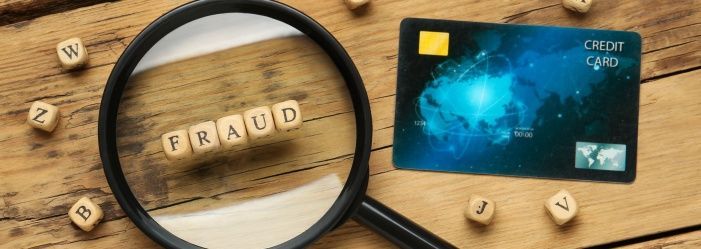Last Updated: April 4, 2024
Understand What Credit Card Fraud Alerts are All About

Disclaimer: We are not qualified legal or tax professionals and are not giving advice. Always speak with a qualified professional before making any legal or financial decisions.
Every year, it seems an inevitable inconvenience pops up in our inboxes: a fraud alert from our credit card company, warning us of potential unauthorized activity. While the prompt advice often reads, 'Don't worry; we've got it handled,' a part of us wonders if there's more we should be doing to protect our financial identity.
Fraud alerts are not just notifications; they're wake-up calls to reassess how we safeguard our financial information in an era where digital transactions are the norm.
This guide will not only walk you through the immediate steps to take when receiving a fraud alert but also equip you with strategies to fortify your defenses against future threats, blending precautionary tales with practical advice for comprehensive financial well-being.
Prefer talking over reading? Get in touch with a debt specialist for a free consultation right away.
What is a credit card fraud alert?
A card fraud alert is a notification of potential theft, typically through something like identity theft.
This might be triggered by unusual activity such as many online purchases in a short period of time, an atypical geographic location for the purchase (e.g., if you live in one location but the transaction happened in a different location), multiple attempts to use your card too quickly, or any other number of suspicious behaviors that will indicate abuse on your credit card.
Credit card companies will usually send fraud alerts via email or text message to warn their customers that activity has been detected on an account.
Contact the credit card company immediately and report the fraudulent activity
When alerted to suspicious activity, it's important that the first thing you should do is to contact your credit card company and alert them of the issue immediately so they can help you further investigate in case there is some sort of breach or criminal act at play.
Credit cards typically don't provide customer service over the phone unless a specific request for assistance has been made by their customer, but many do offer 24/hr online chat services which will be much quicker than trying to call during business hours.
If something doesn't feel right about your credit card fraud alert - no matter how small or large- make sure to confirm with your credit card company as soon as possible.
Request a new credit card card
It's usually good practice to request a new credit card, pin number, or password to make sure you have all your account information in order to close the account or stop it from any more potential fraud charges.
A credit card can be replaced for many reasons ranging from lost, stolen, unauthorized charges, or even a change in address. A customer service representative should be able to provide ample information in regard to the process for requesting such an item.
Authorization is not needed to initiate this process. The only requirement being that sufficient identification is provided at the time of replacement request which includes:
- Photo ID Over 18
- Proof of Social Security Number
- Proof of Current Address
Check your credit score
Check your credit score for any changes that may be related to fraud alerts. Credit score monitoring is a great way to track all changes in your credit score.
Equifax Credit Monitoring Service provides you with the ability to monitor, store & protect your financial information for 12 months or more. This service will also alert you if any changes occur on your accounts so you can take immediate action as necessary and provide up-to-date notification from one central location about potentially fraudulent activity involving yourself or present/future account holders (Eligible Family Members).
Learn more from our article The 8 Best Apps for Monitoring Your Credit Score.
Monitor your bank statements
It is never too late to start monitoring your bank statements. As fraudulent cases go up because of technological advances that enable criminals to commit more crimes faster and easier than ever before, it has become all the more important for citizens to stay vigilant in order to avoid becoming a victim of online fraud.
The occurrence of credit card fraud has been on the rise in America since 2012-2016 by 8% thus far making 2017 potentially the worst year yet with 12 million reports filed for ID theft as well as identity fraud violations according to an article published by nbcnews.com.
Monitor your bank statements every day for unusual transactions, and if you see anything out of the ordinary, contact your bank immediately.
When a credit card fraud alert is issued by law enforcement or an individual's financial institution to warn consumers about possible fraudulent transactions on their cards, it should be taken seriously as these alerts are not only meant to protect accounts but also personal information that might have been compromised.
Consider identity theft protection
There are services like LifeLock for a reason. Credit card fraud alerts should be taken seriously because a lot of people might not even know that they are victims until it's too late.
Identity theft protection, in a nutshell, is all of the measures you can take to prevent someone from stealing your identity. It includes taking steps to protect your personal data and good security practices for protecting online accounts such as bank or credit card accounts.
What are some examples of credit card fraud?
Some common forms of identity theft are "phishing" (online scams which try to get you to provide information such as usernames and passwords by posing as a legitimate organization), "smishing" (text messaging that tricks people into sending their financial data), and “sawing” (undercover fraudsters who will disguise themselves with makeup like police officers).
Less-common types include medical identity theft, phone hijacking, and “shoulder surfing” (looking over someone's shoulder to gain their personal information).
If you receive a Credit Card Fraud Alert, it means that your account has been compromised or is at risk of being stolen. Review the messages carefully.
The Credit Card company will often send an email and/or text message with instructions on what steps need to be taken next in order to safeguard against potential fraud.
Make sure to read all of these messages carefully and follow any instructions provided by the Credit Card Company.
Tips for Monitoring Your Credit and Accounts
While credit monitoring and fraud alerts can help protect you after fraud occurs, there are also important steps you can take to detect issues early. Be proactive about monitoring your credit reports and financial accounts on a regular basis.
Here are some tips:
- Sign up for free credit monitoring services through Experian, Equifax, or TransUnion to receive alerts whenever inquiries or new accounts are opened in your name. This allows you to address issues quickly. This allows you to address issues quickly. See our guide on The Ultimate Guide to Protecting Yourself from Scams and Identity Theft for more prevention tips.
- Check your credit reports routinely (every 3-6 months) through AnnualCreditReport.com. Scan for unfamiliar account activity. Identity theft can negatively impact your credit, so it's important to monitor closely. Learn more in our article Can Identity Theft Ruin Your Credit Score?
- Set up customizable account alerts through your financial institutions to be notified about large purchases, cash withdrawals, low balances, denied transactions, and other red flags.
- Use personal finance apps like Mint to monitor all financial accounts in one dashboard. Unusual transactions are quick to identify when everything is accessible in one place.
Recovering From Identity Theft
If you've become the victim of full-blown identity theft, such as someone opening credit cards or taking out loans in your name, you'll need to take steps beyond just contacting your bank and placing a fraud alert.
Here is an overview of how to recover:
- Request an Identity Protection PIN (IP PIN) from the IRS to prevent someone else from filing taxes under your Social Security number.
- Submit an identity theft affidavit and police report to credit reporting agencies to have fraudulent accounts/inquiries removed. Provide these documents to creditors as well.
- Ensure no inaccurate information remains on your credit reports by checking them frequently and disputing any fraud. Enlist an identity restoration service if needed.
- Consider adding a credit freeze to restrict access to your credit reports in the future. This makes it harder for someone to open new fraudulent accounts.
- Continue monitoring accounts closely for the next year. Further identity theft protection measures may be needed to fully restore your identity and credit.
FAQs
Conclusion about credit card fraud
We have provided some helpful tips to keep your credit card safe, but if you ever spot a fraudulent charge on your account, there are certain steps you should take.
If someone has used your credit card without permission or committed identity theft and made unauthorized purchases with it, contact the police immediately so that they can investigate the situation.
You may also want to file an Identity Theft Report with one of these organizations: Equifax, Experian, TransUnion. Since this is such a sensitive issue, don't forget that we're here for you 24/7!
If you have questions about your debt, contact one of our debt specialists. We offer a free consultation.
*Disclaimer: Pacific Debt Relief explicitly states that it is not a credit repair organization, and its program does not aim to improve individuals' credit scores. The information provided here is intended solely for educational purposes, aiding consumers in making informed decisions regarding credit and debt matters. The content herein does not constitute legal or financial advice. Pacific Debt Relief strongly advises individuals to seek the counsel of qualified professionals before undertaking any legal or financial actions.
Reduce Your Credit Card Debt By Up to Half

BBB Reviews | 4.9/5.0 Rating









 Do Not Sell My Personal Information
Do Not Sell My Personal Information